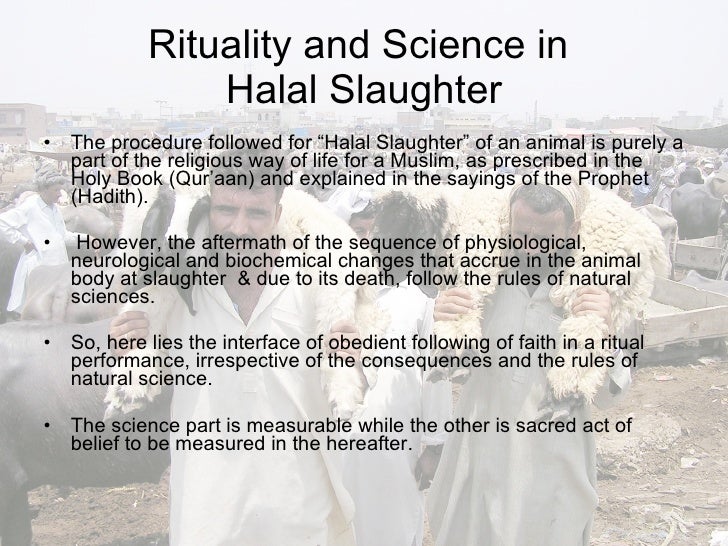Addressing The Ethical Issues Of Halal Slaughter For Vegans

Table of Contents
The Core Vegan Ethical Stance and its Conflict with Halal Slaughter
The central tenet of veganism is the minimization of animal suffering. This principle directly clashes with certain aspects of halal slaughter, leading to ethical concerns for many vegans.
Animal Suffering and the Principle of Non-Violence
Vegans advocate for non-violence towards animals, believing they have a right to live free from human exploitation. Halal slaughter, while aiming for swift death, involves the cutting of an animal's throat without prior stunning in many interpretations. This process, if not performed with utmost precision and speed, can potentially cause significant pain and suffering. [Link to study on animal welfare in halal slaughter, if available].
- Lack of consistent stunning practices: The absence of standardized stunning procedures across halal slaughterhouses raises concerns about inconsistent levels of pain experienced by animals.
- Potential for prolonged suffering: If the cut is not precise and swift, the animal may experience a prolonged period of pain and distress before death.
- Concerns about animal sentience: The capacity of animals to feel pain and fear is a crucial aspect of the ethical debate, with many arguing that animals deserve consideration and respect.
The Question of Consent and Agency
Vegan ethics often emphasize the animals' right to life and autonomy. From this perspective, halal slaughter, even if performed "humanely," represents a violation of an animal's right to life and self-determination. The act of killing, regardless of method, is seen as fundamentally unethical.
- Inherent conflict between human needs and animal rights: The ethical dilemma lies in balancing human needs for food with the animals' right to life.
- Ethical considerations of using animals for food: Many vegans argue that using animals for food is inherently unethical, regardless of the method of slaughter.
- Philosophical debate surrounding animal sentience and rights: The very definition of sentience and the moral standing of animals remain key points of philosophical debate.
Examining the Halal Principles and Practices
Understanding the ethical concerns requires examining the religious context and practices surrounding halal slaughter.
The Religious Context and Justification
Halal slaughter is rooted in Islamic principles emphasizing respect for life and the minimization of suffering. Islamic teachings prescribe specific methods to ensure the animal's death is quick and painless. However, the interpretation and implementation of these principles can vary widely.
- Religious obligations and interpretations: Differing interpretations of religious texts can lead to variations in slaughterhouse practices.
- The role of religious authorities: Religious authorities play a crucial role in setting guidelines and ensuring adherence to halal principles.
- Potential for variation in practice: Variations in practice arise from different interpretations and regional traditions.
Variations in Halal Slaughter Techniques and Their Implications
The techniques used in halal slaughter vary across regions and interpretations, significantly impacting animal welfare.
- Pre-slaughter stunning practices and their effectiveness: The use (or lack thereof) of stunning methods before slaughter significantly affects the animal's experience. The effectiveness of stunning techniques is also a critical consideration.
- Variations in the speed and precision of the slaughter process: The speed and precision of the cut directly influence the level of pain experienced by the animal.
- The impact of different knife types and techniques: The sharpness and type of knife, as well as the skill of the slaughterer, can all influence the outcome.
Potential Areas of Common Ground and Dialogue
Despite the inherent ethical differences, there's potential for common ground and constructive dialogue between vegans and those involved in halal meat production.
The Importance of Improved Animal Welfare Standards
Collaboration between vegans and those involved in the halal meat industry is crucial for improving animal welfare standards within halal slaughterhouses.
- Advocating for improved stunning techniques: Promoting the adoption of more effective and humane stunning methods before slaughter is paramount.
- Enhancing training and certification programs for halal slaughterers: Improved training can ensure higher levels of skill and precision in the slaughter process.
- Strengthening oversight and inspection of halal slaughterhouses: Stricter regulations and inspections are essential to ensure compliance with animal welfare standards.
Exploring Alternative Food Systems and Practices
Reducing reliance on animal products through plant-based alternatives offers a significant opportunity for collaboration.
- Promoting vegan and vegetarian diets as an alternative: Encouraging the adoption of plant-based diets can reduce the demand for animal products.
- Investing in research and development of plant-based meat substitutes: Continued innovation in plant-based alternatives provides ethical and sustainable options.
- Supporting initiatives for sustainable and humane food production: Supporting sustainable and humane food production systems, including those focused on plant-based options, is crucial.
Conclusion: Finding Common Ground in the Ethical Debate Surrounding Halal Slaughter for Vegans
This article has explored the complex ethical issues surrounding halal slaughter from a vegan perspective. The core vegan ethical stance emphasizes minimizing animal suffering, which clashes with aspects of traditional halal slaughter practices. However, shared goals exist, primarily in improving animal welfare standards within halal slaughterhouses. Collaboration between vegans and those involved in halal meat production can lead to improvements in stunning techniques, training, and regulation. Furthermore, the exploration of alternative food systems, including plant-based alternatives, offers a pathway towards a more ethical and sustainable future. Let's continue the discussion and work together to promote improved animal welfare practices and explore sustainable alternatives to reduce the need for animal-based food sources. Learn more about the ethical implications of Halal slaughter and veganism and contribute to a more compassionate food system.

Featured Posts
-
 Analyzing The 2025 Nba Draft Lottery Odds Who Will Land Cooper Flagg
May 13, 2025
Analyzing The 2025 Nba Draft Lottery Odds Who Will Land Cooper Flagg
May 13, 2025 -
 Nhl Draft Lottery Islanders Win Top Selection Sharks Get Second
May 13, 2025
Nhl Draft Lottery Islanders Win Top Selection Sharks Get Second
May 13, 2025 -
 Portola Valley Mourns The Loss Of Public Servant Sue Crane At 92
May 13, 2025
Portola Valley Mourns The Loss Of Public Servant Sue Crane At 92
May 13, 2025 -
 Wildlife Wonders Exploring The Animal Kingdoms Diversity
May 13, 2025
Wildlife Wonders Exploring The Animal Kingdoms Diversity
May 13, 2025 -
 Skarlet Gioxanson Oristiki I Apofasi Den Epistrefei Os Black Widow
May 13, 2025
Skarlet Gioxanson Oristiki I Apofasi Den Epistrefei Os Black Widow
May 13, 2025
